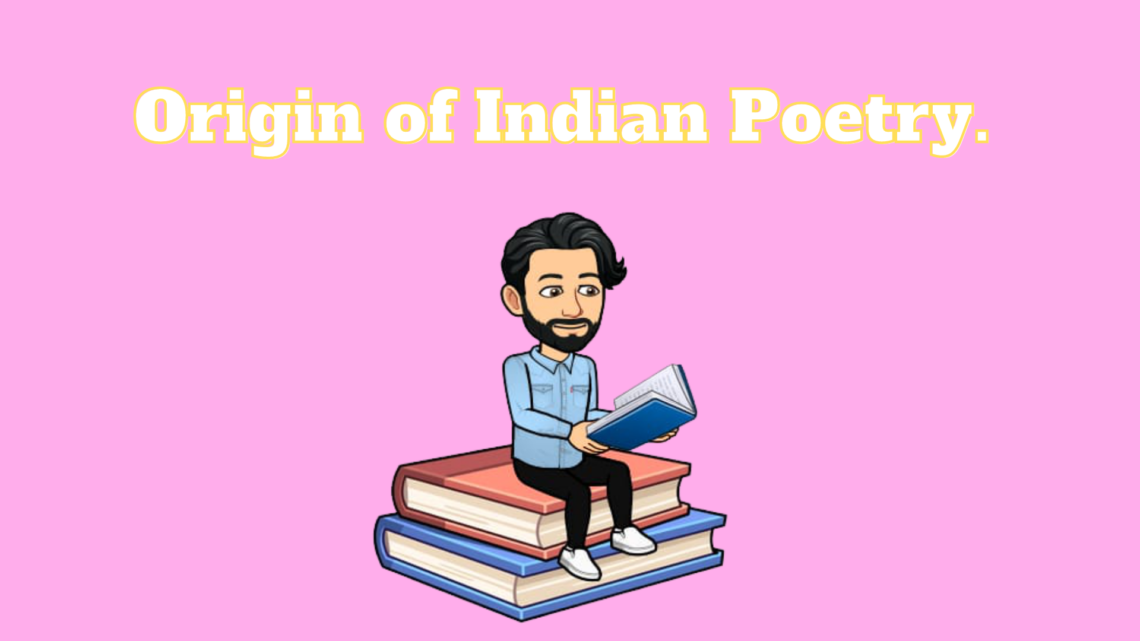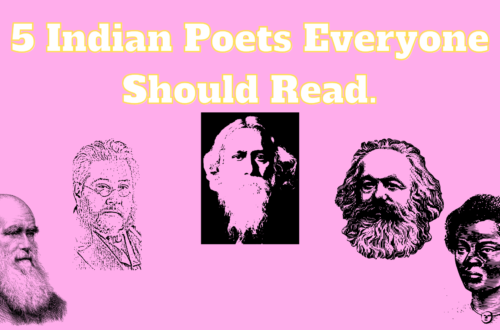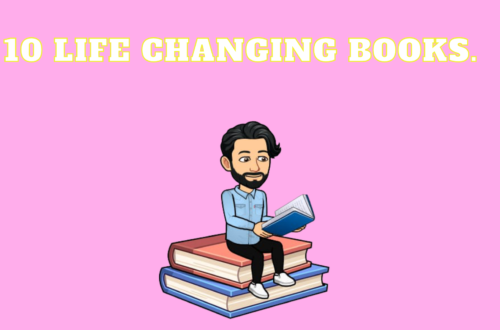
Origin of Indian Poetry.
Origin of Poetry
The word poetry came from the medieval Latin word “poetria,” from Latin poeta, ‘poet.’ Earlier term referred to creative literature. Poetry was in the oral form before writing. Many ancient poems were prayers or religious stories, historical accounts, love songs, and fiction. The Vedas (1500 – 1000 BC) and the Odyssey (800 – 675 BC) is said to be composed in poetic forms. Tale of the Shipwrecked Sailor, in Hieratic language, around 2500 B.C.E, is the oldest speculated fiction poem.
Origin of Indian Poetry
The oldest epic poetry is the Indian Sanskrit epics Ramayana and Mahabharata in India. Indian poetry and Indian literature go back to Vedas times. Various Indian languages, including Vedic Sanskrit, Classical Sanskrit, Tamil, Kannada, Telugu, Odia, Maithili, Bengali, Assamese, Urdu, and Hindi, show signs of ancient poetry in India. Indian poetry reflects diverse spiritual traditions.
Themes of Indian Poetry
The themes of Indian poetry vary from poems about brave warriors, devotional poems, and romance poems to modern literature. Poems about Indian ethics, traditions, cultures, customs and religious ancestry are in various Indian languages in India.
Indian poetry is in Assamese, Bengali, Gujarati, Hindi, Kashmiri, Konkani, Maithili, Malayalam, Manipuri, Marathi, Nepali, Odia, Punjabi, Rajasthani, Tamil, Telugu, Kannada, Sanskrit, Sindhi, and Urdu. In the 1900s, Indian poets also began writing in the English language.
Indian poetry went from traditional religious aspects and romantic love to nationalism and social reform. The portrayal of social issues and moral values are also through these poems. Philosophy, history, and art were among the themes of Indian poetry.
Famous poets in India
The greatest Indian poets of all time are Kabir Das, Kali Das, Mirza Ghalib, Amir Khusrow, Mirabai, Mir Taqi Mir, Rabindranath Tagore, and Kamala Surayya. Tulsidas, Narsinh Mehta, Nissim Ezekiel, Gulzar, Kumar Vishwas, Vikram Seth, Amrita Pritam, and Subramaniya Bharathiyar are also notable Indian poets.
Kabir das wrote in Hindi, mixed with Avadhi, Braj, and Bhojpuri dialects. His poems reflected various aspects of life and faith. His poems are famously known as “Dohas.” His poems had criticism and philosophies showcasing the meaning of actual devotion. His famous works were Abode of the Beloved, There’s a moon inside my body, Illusion and Reality, and Where do you search me.
Kalidasa wrote in Sanskrit. He wrote plays and poems based on the Vedas, Puranas, Ramayana, and Mahabharata. He is known as the ‘Prince of Indian Poets’ and ‘Indian Shakespeare.’ His notable works include the elegiac poem called The Cloud-Messenger and The Seasons.
Mirza Asadullah Baig Khan, known as Mirza Ghalib, wrote in Urdu, Persian, Turkish, and Arabic. He wrote on various subjects like philosophy, existentialism, mysteries of life, and many more. His famous works include Aah ko chahiye ek umr asar hote tak, Dil-e-naddan tujhe hua kya hai, Hazaron Khwahishen aisi ki har Khwahish pe dam nikle, ‘Koi ummid bar nahin aati,’ ‘Ye na thi hamari qismat ki visal-e-yar hota.’
Amir Khusrow is a Sufi poet and the Father of Urdu Literature. His works were mainly in Persian and Urdu. His poetry has different forms, such as ghazals, masnavi, qata, and rubai. His notable works are Tuhfat us-Sighr, Wast ul-Hayat, Ghurrat ul-Kamaal, and Ijaz-e-Khusravi.
Mirabai’s work wrote about Lord Krishna, in which she portrayed her devotion. There are no preserved original manuscripts of her work. Her poem themes are divinity, mysticism, and love. Her famous works include I am mad in love, ‘Nothing is really mine except Krishna,’ and I send letters and Keep up your promise.
Mir Taqi Mir wrote in Urdu. He was known as the pioneer of the formation of the Urdu language and Urdu poetry. His work revolved around the themes of love and spirituality and his personal life tragedies, including the untimely deaths of his family members. His famous works include Chaman Main Gul Ne Jo Ka, Khuda Ko Kaam To Sonpay Hain, Dard Be Ikhtiar, and Bewafai Pey Teri.
Rabindranath Tagore won the Nobel Prize in Literature and wrote primarily in Bengali. He was the first non-European and Asian to mark his significance in literature. He also wrote novels, dramas, and short stories. He is best known for ‘Gitanjali’, a poetry collection.
Kamala Surayya was a prominent figure in Indian-English language poetry. She is famous for her pen-name ‘Madhavikutty’ and wrote on issues including love, betrayal, female sexuality, and politics. Her notable works include The Looking Glass, Words, Relationship, and In Love.
Famous Hindi Poets in India
The number of notable poets in the Hindi language is 100 people approximately. Some of the greatest Hindi poets of India are Makhanlal Chaturvedi, Maithili Sharan Gupt, Harivansh Rai Bachchan, Mahadevi Verma, Sumitra Nandan Pant, Jaishankar Prasad, Suryakant Tripathi Nirala, Ramdhari Singh Dinkar, and Abdul Rahim Khan-e-Khana. Dharmavir Bharati, Surya Kumar Pandey, Ravindra Prabhat, Shivmangal Singh Suman, Uday Prakash, and Hemant Shesh are notable poets in India.
Indian Poetry Awards
Very few literary awards are there in India for poetry alone. These include Jnanpith Award, Ananda Puraskar, Rabindra Puraskar, and Sahitya Akademi Awards.
Firaq Gorakhpuri, Kavi Samrat Viswanantha Satyanarayana, Amrita Pritam, Qurratulain Hyder, Singireddi Narayana Reddi, and O. N. V. Kurup are some of the notable poets. They won the Jnanpith Award for their works in different years.
Prominent Sahitya Akademi Awards winners in different Indian languages, including
‘Sunehe,’ 1956 – Amrita Pritam – Punjabi
‘Divya Prithivi,’ 1960 – V. K Gokak – Kannada
‘Natsamrat,’ 1974 – Kusumagraj – Marathi
‘Awara Sajde,’ 1975 – Kaifi Azmi – Urdu
‘Sei Somoy,’ 1984 – Sunil Gangopadhyaya – Bengali
‘Lilatamsa’, 1984 – Kanhaiyalal Sethia – Rajasthani
‘Saichor Pathar Manuh,’ 1992 – Hiren Bhattacharya – Assamese
‘Tadaiva Gaganam Shaivadhara,’ 1999 – Srinivas Rath – Sanskrit
‘Tanmaya Dhuli,’ 2001 – Pratibha Satpathy – Odia
Origin is the thing that gives a glimpse of greatness, check out Madhushala by Harivansh Rai Bachchan.




